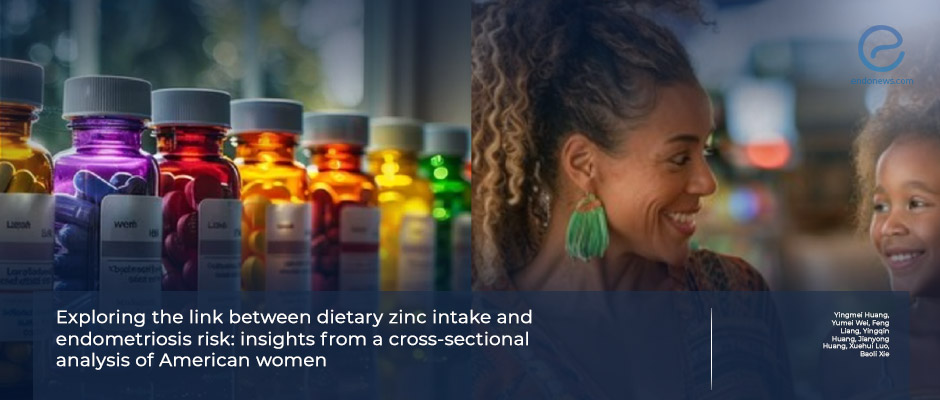Dietary Zinc Intake and Endometriosis Risk in American Women
Nov 7, 2024
Exploring How Zinc Intake May Influence Endometriosis Risk
Key Points
Highlight
- There seems to be a positive association between dietary zinc intake and endometriosis.
- Further research is needed to determine if dietary zinc could be a modifiable factor in disease prevention and treatment.
Importance
- Zinc plays a crucial role in reproductive health and may influence the development and progression of endometriosis, highlighting its potential as a modifiable risk factor for the condition.
What’s done here?
- This cross-sectional study conducted over 4300 American women was conducted to address zinc’s role in endometriosis.
- Data was obtained from National Health and Nutrition Examination Survey between 1999-2006.
- Endometriosis was self-reported based on responses to a reproductive health questionnaire.
- Dietary zinc and nutrient intakes were calculated using data from the National Survey Nutrients Database, and 24-hour recall interviews ensured data accuracy, excluding supplements.
Key results
- Multivariable logistic regression model showed a positive correlation between dietary zinc intake and endometriosis risk, even after adjusting for confounding variables.
- Individuals consuming over 14 mg/day of zinc had a significantly higher risk of endometriosis compared to those consuming 8 mg/day or less.
Limitations
- The study design limits establish causation, and despite adjustments, unmeasured variables; self-reported dietary data may introduce confounding bias.
- The absence of data on endometriosis subtypes, stages and comorbidities constrains their findings.
Lay Summary
In a study published in the BMC Public Health, Xie et al. investigated the potential effect of zinc intake and the prevalence of endometriosis with a cross-sectional study.
The findings revealed a significant positive association between higher dietary zinc intake and endometriosis prevalence, particularly among women consuming more than 14 mg/day of zinc. Sensitivity analyses upheld these results, demonstrating that the association remained consistent across subgroups defined by demographic and lifestyle variables.
This robust association underscores zinc's potential role in immune modulation and oxidative stress reduction, factors relevant to endometriosis pathophysiology. However, the cross-sectional design limits causal inferences, and the study's reliance on self-reported dietary intake poses challenges to accurately capturing total zinc status.
While the study highlights an intriguing link between zinc intake and endometriosis, it also calls attention to the need for more comprehensive studies. Future research with controlled, multicenter trials across diverse populations could provide a deeper understanding of how dietary zinc influences endometriosis risk and whether it could serve as a modifiable factor in preventive strategies.
Additionally, investigating the effects of zinc on endometriosis subtypes and comorbidities would offer a more nuanced perspective, potentially guiding tailored approaches in women’s health management and endometriosis treatment.
Research Source: https://pubmed.ncbi.nlm.nih.gov/39443887/
Endometriosis Zinc NHANES Cross-sectional study

